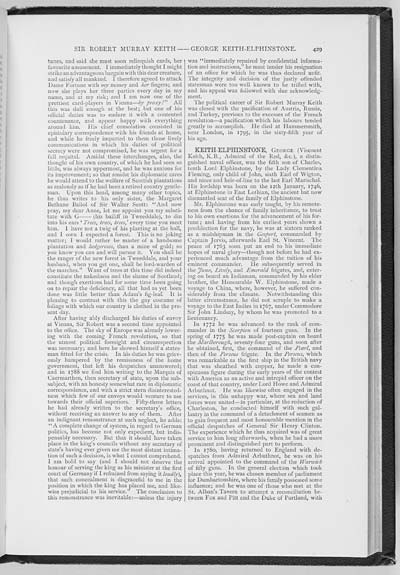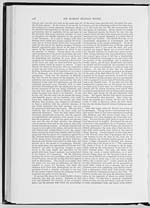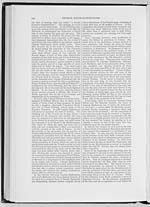Volume 2 > Half-Volume 4
(185) Page 429 - Keith-Elphinstone, George
Download files
Individual page:
Thumbnail gallery: Grid view | List view

429 tunes, and said she must soon relinquish cards, her favourite amusement. I immediately thought I might strike an advantageous bargain with this dear creature, and satisfy all mankind. I therefore agreed to attack Dame Fortune with my money and her fingers; and now she plays her three parties every day in my name, and at my risk; and I am now one of the prettiest card-players in Vienna�by proxy!" All this was dull enough at the best; but one of his official duties was to endure it with a contented countenance, and appear happy with everything around him. His chief consolation consisted in epistolary correspondence with his friends at home, and while he freely imparted to them those lively communications in which his duties of political secrecy were not compromised, he was urgent for a full requital. Amidst these interchanges, also, the thought of his own country, of which he had seen so little, was always uppermost, and he was anxious for its improvement; so that amidst his diplomatic cares he would attend to the welfare of Scottish plantations as zealously as if he had been a retired country gentle- man. Upon this head, among many other topics, he thus writes to his only sister, the Margaret Bethune Baliol of Sir Walter Scott: "And now pray, my dear Anne, let me appoint you my substi- tute with G------(his bailiff in Tweeddale), to din into his ears ' Trees, trees, trees,' every time you meet him. I have not a twig of his planting at the hall, and I own I expected a forest. This is no joking matter; I would rather be master of a handsome plantation and hedgerows, than a mine of gold; so you know you can and will pursue it. You shall be the ranger of the new forest in Tweeddale, and your husband, when you get one, shall be lord-warden of the marches." Want of trees at this time did indeed constitute the nakedness and the shame of Scotland; and though exertions had for some time been going on to repair the deficiency, all that had as yet been done was little better than Adam's fig-leaf. It is pleasing to contrast with this the gay costume of foliage with which our country is clothed in the pre- sent day. After having ably discharged his duties of envoy at Vienna, Sir Robert was a second time appointed to the office. The sky of Europe was already lower- ing with the coming French revolution, so that the utmost political foresight and circumspection was necessary; and here he showed himself a states- man fitted for the crisis. In his duties he was griev- ously hampered by the remissness of the home government, that left his despatches unanswered; and in 1788 we find him writing to the Marquis of Caermarthen, then secretary of state, upon the sub- subject, with an honesty somewhat rare in diplomatic correspondence, and with a strict stern disinterested- ness which few of our envoys would venture to use towards their official superiors. Fifty-three letters he had already written to the secretary's office, without receiving an answer to any of them. After an indignant remonstrance at such neglect, he adds: "A complete change of system, in regard to German politics, has become not only expedient, but indis- pensably necessary. But that it should have taken place in the king's councils without any secretary of state's having ever given me the most distant intima- tion of such a decision, is what I cannot comprehend. I am bold to say (and I should not deserve the honour of serving the king as his minister at the first court of Germany if I refrained from saying it loudly), that such concealment is disgraceful to me in the position in which the king has placed me, and like- wise prejudicial to his service." The conclusion to this remonstrance was inevitable:�unless the injury was "immediately repaired by confidential informa- tion and instructions," he must tender his resignation of an office for which he was thus declared unfit. The integrity and decision of the justly offended statesman were too well known to be trifled with, and his appeal was followed with due acknowledg- ment. The political career of Sir Robert Murray Keith was closed with the pacification of Austria, Russia, and Turkey, previous to the excesses of the French revolution�a pacification which his labours tended greatly to accomplish. He died at Hammersmith, near London, in 1795, in the sixty-fifth year of his age. KEITH-ELPHINSTONE, GEORGE (Viscount Keith, K.B., Admiral of the Red, &c.), a distin- guished naval officer, was the fifth son of Charles, tenth Lord Elphinstone, by the Lady Clementina Fleming, only child of John, sixth Earl of Wigton, and niece and heir-of-line to the last Earl Marischal. His lordship was born on the 12th January, 1746, at Elphinstone in East Lothian, the ancient but now dismantled seat of the family of Elphinstone. Mr. Elphinstone was early taught, by his remote- ness from the chance of family inheritance, to trust to his own exertions for the advancement of his for- tune ; and having from his earliest years shown a predilection for the navy, he was at sixteen ranked as a midshipman in the Gosport, commanded by Captain Jervis, afterwards Earl St. Vincent. The peace of 1763 soon put an end to his immediate hopes of naval glory�though not before he had ex- perienced much advantage from the tuition of his eminent commander. He subsequently served in the Juno, Lively, and Emerald frigates, and, enter- ing on board an Indiaman, commanded by his elder brother, the Honourable W. Elphinstone, made a voyage to China, where, however, he suffered con- siderably from the climate. Notwithstanding this latter circumstance, he did not scruple to make a voyage to the East Indies in 1767, under Commodore Sir John Lindsay, by whom he was promoted to a lieutenancy. In 1772 he was advanced to the rank of com- mander in the Scorpion of fourteen guns. In the spring of 1775 he was made post-captain on board the Marlborough, seventy-four guns, and soon after he obtained, first, the command of the Pearl, and then of the Perseus frigate. In the Perseus, which was remarkable as the first ship in the British navy that was sheathed with copper, he made a con- spicuous figure during the early years of the contest with America as an active and intrepid officer on the coast of that country, under Lord Howe and Admiral Arbuthnot. He was likewise often engaged in the services, in this unhappy war, where sea and land forces were united�in particular, at the reduction of Charleston, he conducted himself with such gal- lantry in the command of a detachment of seamen as to gain frequent and most honourable mention in the official despatches of General Sir Henry Clinton. The experience which he thus acquired was of great service to him long afterwards, when he had a more prominent and distinguished part to perform. In 1780, having returned to England with de- spatches from Admiral Arbuthnot, he was on his arrival appointed to the command of the Warwick of fifty guns. In the general election which took place this year, he was chosen member of parliament for Dumbartonshire, where his family possessed some influence; and he was one of those who met at the St. Alban's Tavern to attempt a reconciliation be- tween Fox and Pitt and the Duke of Portland, with
Set display mode to:
![]() Universal Viewer |
Universal Viewer | ![]() Mirador |
Large image | Transcription
Mirador |
Large image | Transcription
Images and transcriptions on this page, including medium image downloads, may be used under the Creative Commons Attribution 4.0 International Licence unless otherwise stated. ![]()
| Biographical dictionary of eminent Scotsmen > Volume 2 > Half-Volume 4 > (185) Page 429 - Keith-Elphinstone, George |
|---|
| Description | Spine title: Half-Vol. IV. Heriot to Lynedoch. |
|---|---|
| Description | Volume II. Contains names alphabetically from Falconer to Lynedoch. |
|---|

